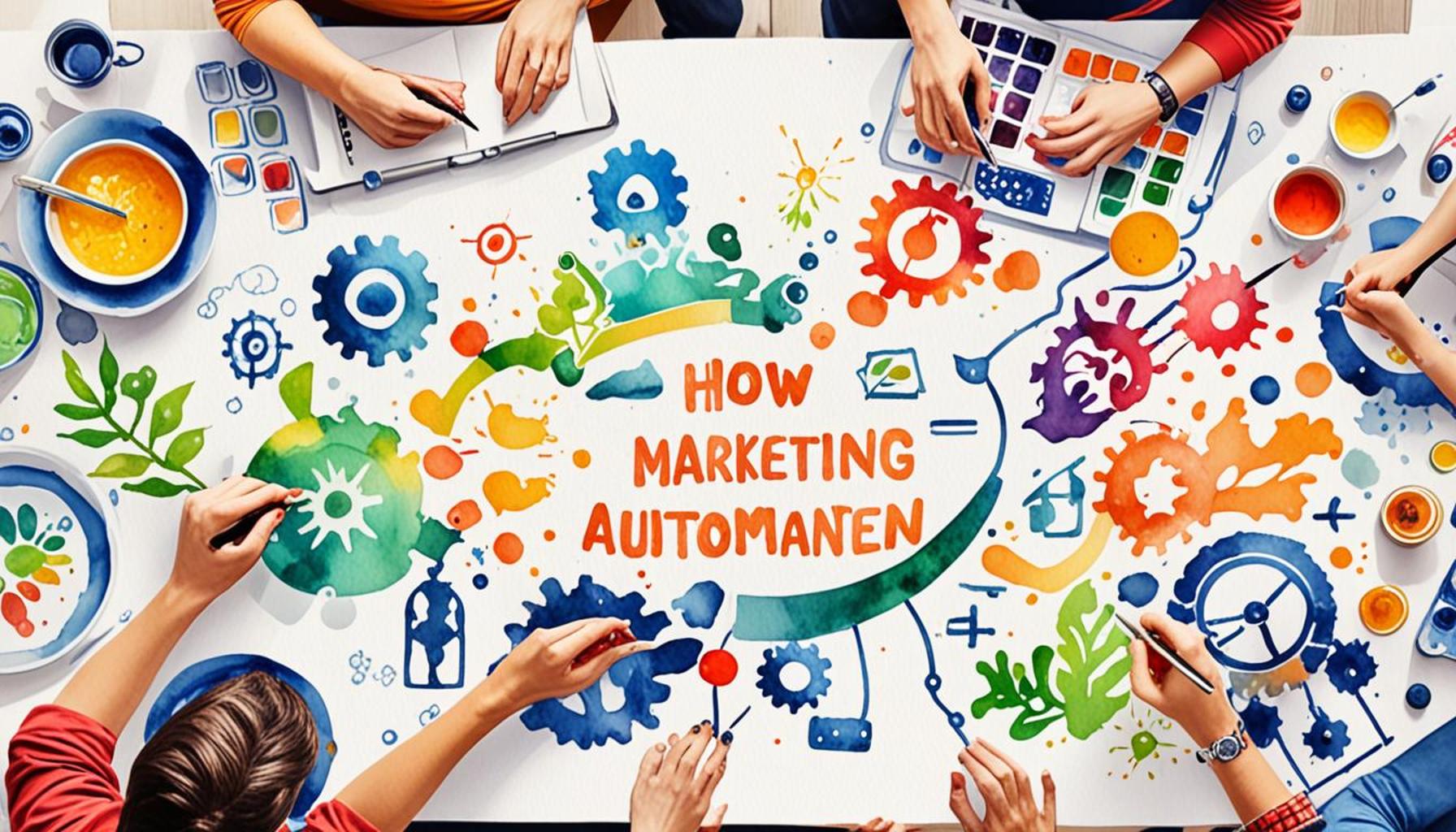How Marketing Automation Can Increase E-commerce Conversion

The Transformative Impact of Marketing Automation on E-Commerce
In an era where convenience and creativity collide, businesses are increasingly seeking innovative strategies to enhance their e-commerce conversions. One powerful tool that has emerged in this digital landscape is marketing automation. By automating repetitive tasks, companies can fine-tune their processes, ensuring that they engage customers in a more personalized and meaningful way.
Visualize a scenario where your marketing campaigns operate seamlessly, allowing you to devote your energy toward formulating strategic growth initiatives. Marketing automation can essentially reshape your e-commerce business, propelling it to new heights. Here’s how:
- Personalized customer experiences: Offering individualized content is crucial in a crowded marketplace. Advanced marketing automation platforms can analyze customer data—like purchasing history and browsing behaviors—to deliver tailored messages at the right time. For instance, utilizing automation to send product recommendations based on past purchases can significantly enhance customer satisfaction and retention.
- Efficient lead nurturing: Attracting potential buyers is just the first step; nurturing those leads is where marketing automation shines. Automated email campaigns can help guide customers through the sales funnel. For example, following up with cart abandonment emails can re-engage shoppers who left items behind, often leading to completed purchases. A well-timed reminder can make all the difference in converting interest into sales.
- Data-driven insights: With automation, businesses gain access to a wealth of analytics regarding customer interactions. This data is invaluable for refining marketing strategies and understanding what resonates with audiences. Using these insights, companies can optimize their campaigns and enhance conversion rates, ensuring every marketing dollar is spent effectively.
These capabilities not only save time, but also deliver impressive results. A recent study revealed that businesses leveraging marketing automation could witness a conversion rate increase of up to 50%. This statistic underscores the profound effect that structured and optimized marketing strategies can have on sales performance.
Given these compelling benefits, it’s clear why marketing automation has become an essential asset for e-commerce success. As the digital market continues to evolve, understanding and implementing these automation strategies will be critical in staying competitive. In the following sections, we will explore specific tactics to help you fully harness the potential of marketing automation, ultimately boosting your online sales and enhancing customer loyalty.
YOU MAY ALSO LIKE: Read read another article
Unlocking the Power of Personalization
In today’s digital marketplace, the importance of creating strong relationships with customers cannot be overstated. One of the most effective ways to cultivate these connections is through personalization. With marketing automation, e-commerce businesses can harness the power of data to deliver experiences that resonate with each shopper individually. This shift towards personalized marketing has not only become a trend but a necessity for organizations aiming to boost conversion rates.
Imagine receiving an email that not only acknowledges your previous purchases but also recommends items that complement them. This level of targeted communication is made possible through sophisticated marketing automation tools that segment consumers based on their behavioral data and preferences. As reported by Evergage, 88% of marketers have seen measurable improvements in their business results from personalization efforts. This statistic emphasizes how crucial it is to integrate personalization into your overall marketing strategy.
Streamlined Customer Journeys
Another critical advantage of marketing automation in the realm of e-commerce is the ability to streamline customer journeys. By automating various touchpoints, businesses can guide potential customers along the path to purchase more effectively. This process often involves several stages, each requiring different strategies:
- Aware: At this stage, capture attention through targeted ads and engaging content that address potential customers’ needs and pain points.
- Consider: Utilize automated follow-ups, such as informative emails, that provide value and foster trust in your brand.
- Decide: Incentives like limited-time discounts or exclusive offers can be sent automatically to encourage decision-making and completion of the purchase.
By structuring your customer journey through automation, your e-commerce business can achieve a more cohesive approach that not only reduces unnecessary friction but also maintains engagement from interest to conversion. Research from HubSpot indicates that companies that excel at lead nurturing generate 50% more sales-ready leads at a 33% lower cost. With marketing automation, you can adopt this approach without the resource drain traditionally associated with lead nurturing.
The Science of Timing and Relevance
Timing is crucial in the e-commerce sector. Automated marketing tools have significantly enhanced the ability to send communications that captivate customers at precisely the right moment. For instance, consider the impact of abandoned cart recovery emails. On average, 70% of online shoppers abandon their carts, leaving significant revenue on the table. By using marketing automation to send timely reminders or offers to these potential buyers, e-commerce businesses can reclaim lost sales and increase their conversion rates.
Moreover, tailored offers based on browsing behavior or special occasions, such as birthdays, can also create a sense of urgency and relevance. According to a survey by Salesforce, 70% of consumers say that connected processes are very important to winning their business, emphasizing how critical it is to deliver the right message at the right time.
Clearly, the role of marketing automation in enhancing e-commerce conversion is profound. As we progress through the article, we will delve deeper into specific strategies that can further leverage the advantages of automation, ensuring your business not only competes but thrives in the dynamic world of online retail.
How Marketing Automation Boosts E-commerce Conversion Rates
Marketing automation plays a pivotal role in streamlining e-commerce operations, allowing businesses to efficiently connect with their target audience and drive conversions. By leveraging data-driven insights and automated tools, e-commerce platforms can optimize various aspects of the customer journey.One of the key advantages of marketing automation is the ability to segment customers based on their behavior and preferences. This means that businesses can tailor their marketing messages and offers to resonate with specific audience segments. As a result, personalized communication leads to higher engagement rates, ultimately increasing the likelihood of conversion.Moreover, marketing automation facilitates timely follow-ups with potential customers. Automated emails can be triggered to remind users about abandoned shopping carts, incentivizing them with special offers or highlighting product benefits. This strategic approach not only rekindles interest but also significantly reduces cart abandonment rates, a common hurdle in e-commerce.Furthermore, using marketing automation tools allows for insightful analytics and reporting. Businesses can track which marketing channels yield the highest conversion rates, enabling data-driven decisions that enhance overall marketing strategies. By continuously analyzing this data, companies can further refine their approach, ensuring they are always aligned with consumer demands and trends.In essence, marketing automation is not just a technology; it is a strategic ally in driving e-commerce conversions. By creating a seamless, personalized customer experience, businesses can foster lasting relationships with their customers, leading to increased loyalty and repeat purchases. The potential for growth through marketing automation in e-commerce is immense, and those who harness this power are likely to stay ahead in an increasingly competitive marketplace.
| Advantages of Marketing Automation | Impact on E-commerce Conversion |
|---|---|
| Targeted Customer Segmentation | Personalized messages enhance engagement and conversion rates. |
| Automated Cart Recovery | Recovers lost sales by reminding customers of abandoned carts. |
| Data Analytics | Enables informed strategies based on real-time performance metrics. |
As e-commerce continues to evolve, implementing marketing automation can significantly enhance conversion strategies, making it an essential tool for businesses looking to thrive in a digital marketplace.
YOU MAY ALSO LIKE: Read read another article
Embracing Data-Driven Insights
In the realm of e-commerce, the adage “data is the new oil” rings particularly true. With marketing automation, businesses can tap into vast pools of data to derive insights that inform their strategies, ultimately enhancing conversion rates. By leveraging analytics integrated within marketing automation platforms, companies gain a clearer understanding of customer behaviors and preferences. This deep-dive into data allows brands to identify trends, allowing them to make informed decisions that align with customer interests.
For instance, A/B testing—an integral part of data-driven marketing—empowers businesses to experiment with different elements of their campaigns, such as subject lines, call-to-action buttons, or even landing page layouts. According to Optimizely, companies that employ A/B testing see conversion rate enhancements of up to 49%. A/B testing through automated campaigns enables organizations to quickly iterate on their marketing tactics based on real user interactions, tailoring the experience to maximize customer satisfaction.
Optimizing Your Customer Relationship Management (CRM)
One of the underpinnings of successful e-commerce conversion is an effective Customer Relationship Management (CRM) strategy. Marketing automation plays an indispensable role in streamlining CRM processes. Systems that automate lead scoring, segmentation, and follow-up actions empower businesses to focus their efforts on high-value leads while ensuring timely communication with existing customers.
For example, consider utilizing a marketing automation platform that analyzes customer data to assign scores based on engagement and purchasing habits. This scoring system allows teams to prioritize leads who are more likely to convert, streamlining efforts to focus on opportunities with the greatest potential return. In fact, according to Gartner, organizations that leverage CRM automation gain up to a 70% improvement in their sales productivity.
Multi-channel Marketing Automation
Consumers today engage with brands across various platforms, from social media to email, and even SMS. Ensuring a consistent and cohesive presence across these channels can seem daunting, but marketing automation simplifies this process. By coordinating messaging across multiple touchpoints, businesses can enhance their brand visibility and consistency, ultimately leading to higher conversion rates.
For instance, an e-commerce company can automate its promotional campaigns across social media platforms while simultaneously sending personalized email offers to its subscribers. A recent study by McKinsey reveals that companies employing multi-channel strategies see a 10% increase in customer retention and a 15% boost in sales. Utilizing automation allows brands to maintain an active presence without overwhelming their teams, ensuring that customers receive timely communications regardless of their preferred channel.
Retargeting and Loyalty Programs
Retargeting is another critical component of e-commerce marketing that can significantly drive conversions. Marketing automation tools can facilitate sophisticated retargeting campaigns that focus on users who have demonstrated interest but have not yet made a purchase. By displaying relevant ads to these potential customers across their digital journeys, you keep your brand top-of-mind and encourage them to return and complete their purchase.
Moreover, marketing automation can also streamline loyalty program management, allowing businesses to automatically reward customer engagements and purchases. A study from Fidelity indicates that loyalty program members are 70% more likely to recommend a brand and spend 20% more than non-members. Implementing automated loyalty programs not only enhances customer retention but can also positively influence their purchasing behavior.
As we continue exploring the wide-ranging impacts of marketing automation on e-commerce conversion, these strategies underscore the importance of integrating cutting-edge technology with customer-centric approaches. With a focus on data, streamlined processes, and targeted engagement, businesses are ideally positioned to optimize their marketing efforts and unlock new revenue potential.
CHECK OUT: Click here to explore more
Conclusion: The Future of E-commerce with Marketing Automation
In today’s fast-paced digital landscape, mastering the art of conversion is the key to e-commerce success. Marketing automation offers a plethora of tools and strategies that not only enhance customer engagement but also drive significant conversion rates. By harnessing data-driven insights, companies can effectively tailor their marketing efforts to meet the dynamic preferences of their audience, ultimately converting potential customers into loyal buyers.
The integration of automation within Customer Relationship Management systems streamlines workflows and prioritizes high-value leads, making it easier for businesses to convert interest into sales. Multi-channel marketing automation further ensures that brands are not only present but also consistently engaged across all platforms, enhancing brand recall and customer satisfaction. Additionally, sophisticated retargeting and loyalty programs keep your brand at the forefront of consumer minds, nurturing relationships that drive repeat purchases.
As e-commerce continues to evolve, the companies that embrace these innovative marketing automation solutions will be the ones leading the pack. The potential for increased conversion rates—drawing from data analytics, A/B testing, streamlined communications, and personalized experiences—provides a transformative approach to reaching consumers effectively. Investing in marketing automation is not merely about keeping pace; it’s about staying ahead of the curve. To dive deeper into this transformative strategy, e-commerce leaders must continue exploring emerging trends and technologies that can elevate their marketing efforts to new heights.


